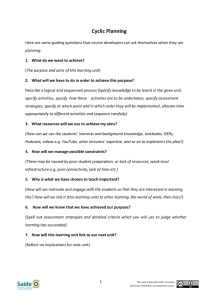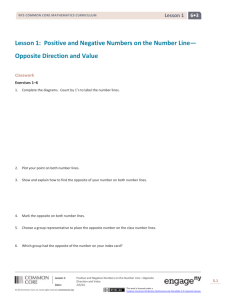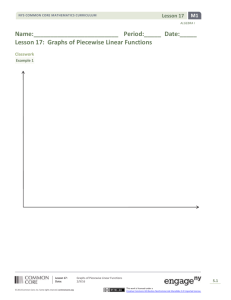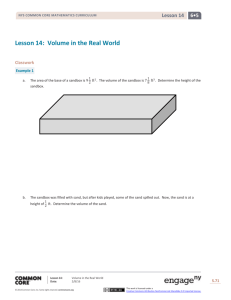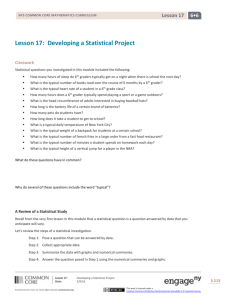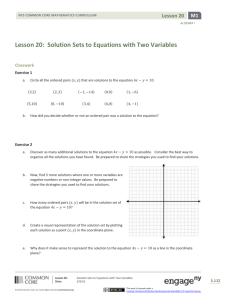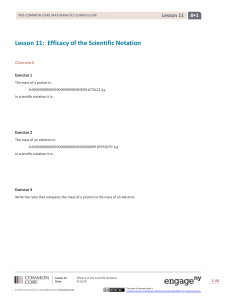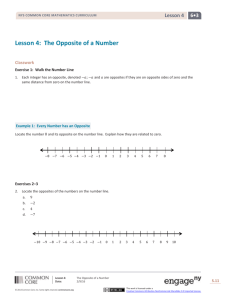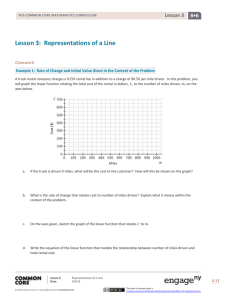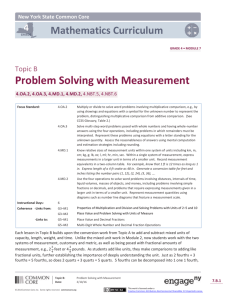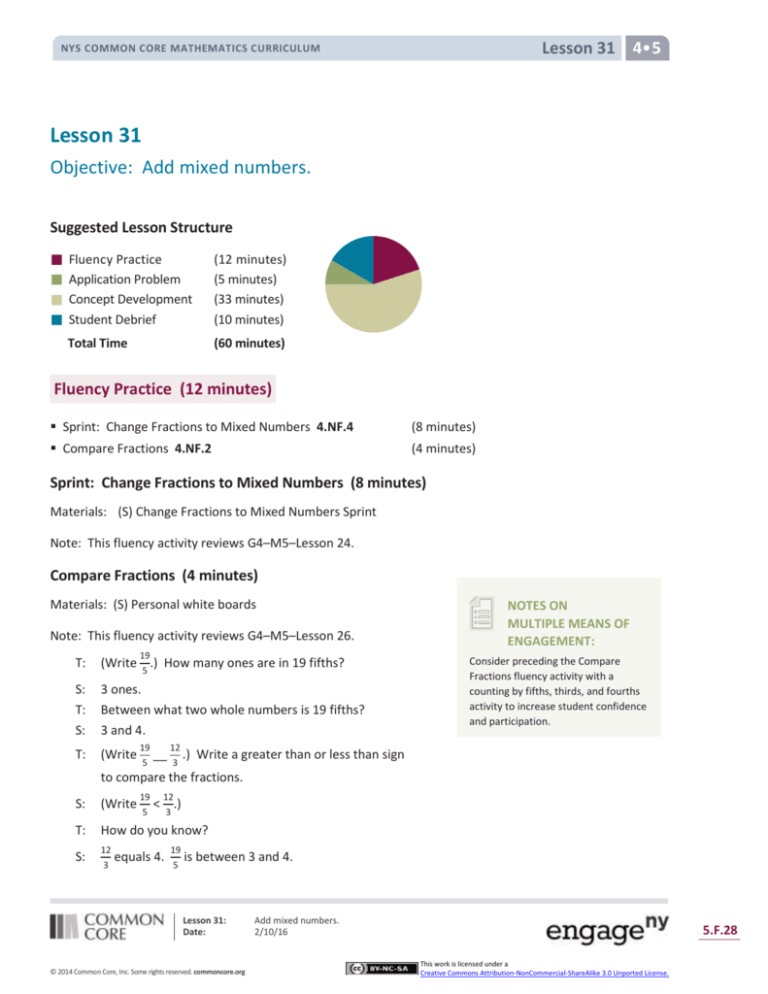
Lesson 31 4•5
NYS COMMON CORE MATHEMATICS CURRICULUM
Lesson 31
Objective: Add mixed numbers.
Suggested Lesson Structure
Fluency Practice
Application Problem
Concept Development
Student Debrief
(12 minutes)
(5 minutes)
(33 minutes)
(10 minutes)
Total Time
(60 minutes)
Fluency Practice (12 minutes)
Sprint: Change Fractions to Mixed Numbers 4.NF.4
(8 minutes)
Compare Fractions 4.NF.2
(4 minutes)
Sprint: Change Fractions to Mixed Numbers (8 minutes)
Materials: (S) Change Fractions to Mixed Numbers Sprint
Note: This fluency activity reviews G4–M5–Lesson 24.
Compare Fractions (4 minutes)
Materials: (S) Personal white boards
Note: This fluency activity reviews G4–M5–Lesson 26.
19
T:
(Write 5 .) How many ones are in 19 fifths?
S:
T:
S:
3 ones.
Between what two whole numbers is 19 fifths?
3 and 4.
T:
(Write
19
5
__
12
.)
3
NOTES ON
MULTIPLE MEANS OF
ENGAGEMENT:
Consider preceding the Compare
Fractions fluency activity with a
counting by fifths, thirds, and fourths
activity to increase student confidence
and participation.
Write a greater than or less than sign
to compare the fractions.
19
5
12
S:
(Write
< 3 .)
T:
How do you know?
S:
12
3
equals 4.
19
5
is between 3 and 4.
Lesson 31:
Date:
© 2014 Common Core, Inc. Some rights reserved. commoncore.org
Add mixed numbers.
2/10/16
5.F.28
This work is licensed under a
Creative Commons Attribution-NonCommercial-ShareAlike 3.0 Unported License.
Lesson 31 4•5
NYS COMMON CORE MATHEMATICS CURRICULUM
Continue the process for the following possible sequence:
25
4
__
20 25
,
5 4
__
26
5
,
26
3
__
32
,
4
and
26
3
19
__ 2 .
Application Problem (5 minutes)
Marta has 2 meters 80 centimeters of cotton cloth and 3 meters 87 centimeters of linen cloth. What is the
total length of both pieces of cloth?
The total length of both pieces of cloth is 6 m 67 cm.
Note: This Application Problem anticipates the adding of two mixed numbers using a measurement context.
Solution A shows a solution whereby the students decomposed 87 centimeters to complete the unit of one
meter and added on the remaining centimeters. Solution B shows a solution whereby the student added all
the centimeters and decomposed the sum.
Concept Development (33 minutes)
Materials: (S) Personal white boards
Problem 1: Add mixed numbers combining like units.
1
2
8
T:
Write
T:
S:
T:
S:
T:
S:
T:
S:
T:
Say the expression using unit form.
2 ones 1 eighth plus 1 one 5 eighths.
What are the units involved in this problem?
Ones and eighths.
When we add numbers, we add like units. (Point to
the mixed numbers and demonstrate.) How many
ones are there in all?
3 ones.
How many eighths are there in all?
6 eighths.
3 ones + 6 eighths is?
S:
38.
MP.2
+
5
1 .
8
Let’s find the sum.
NOTES ON
MULTIPLE MEANS OF
ENGAGEMENT:
English language learners and others
may benefit from explicit instruction
and additional practice speaking mixed
numbers in unit language. If time is a
consideration, prepare students
beforehand to increase confidence and
participation.
6
Lesson 31:
Date:
© 2014 Common Core, Inc. Some rights reserved. commoncore.org
Add mixed numbers.
2/10/16
5.F.29
This work is licensed under a
Creative Commons Attribution-NonCommercial-ShareAlike 3.0 Unported License.
Lesson 31 4•5
NYS COMMON CORE MATHEMATICS CURRICULUM
T:
3
1
3
1
(Write 2 4 + 3 4 = 2 + 4 + 3 + 4 . Pause to allow students to analyze.) From our previous work we
3
4
1
4
3
4
1
4
know 2 + 3 = 2 + + 3 + , true?
MP.2
S:
T:
T:
S:
T:
S:
T:
Yes!
So, we do not have to write all that down.
The sum of the ones is…?
5 ones.
The sum of the fourths is…?
4 fourths.
(Write.)
3
1
4
24 + 34 = 5 +4
T:
S:
= 6.
Explain to your partner how we got a sum of 6.
Easy. 2 ones and 3 ones is 5. Three fourths and 1 fourth is one. Five and 1 makes 6. We just put
the like units together, ones with ones and fourths with fourths. Add the ones. Add the fractions.
1
2
2
2
Let students practice with the following: 5 3 + 6 3 and 21 5 + 10 5. Encourage them to write the solution using
1
2
3
2
2
4
4
the shorter recording method, e.g., 5 + 6 = 11 + = 12 and 21 + 10 = 31 + = 31 , but if they must
3
3
3
5
5
5
5
decompose each addend as a sum, let them. Encourage them to think in terms of what fractional part will get
them to the next whole.
Problem 2: Add mixed numbers when the sum of the fractional units is greater than 1 by combining like
units.
5
8
5
8
T:
(Write 2 + 3 .) Right away we see that the sum of the eighths is greater than 1.
T:
S:
T:
S:
T:
The sum of the ones is…?
5.
The sum of the eighths is…?
10 eighths.
Take out 8 eighths to make one.
S:
1 8. 8 and 8. (Record with a number bond.)
T:
(Write the following.)
2
5
8
5
2
10
8
8
2
= 5 +8 + 8
2
=6
8
28 + 38 = 5 +
2
T:
Explain to your partner how we got a sum of 6 8 .
S:
We added like units. We added ones to ones and eighths to eighths. Then, we changed 10 eighths to
Lesson 31:
Date:
© 2014 Common Core, Inc. Some rights reserved. commoncore.org
Add mixed numbers.
2/10/16
5.F.30
This work is licensed under a
Creative Commons Attribution-NonCommercial-ShareAlike 3.0 Unported License.
Lesson 31 4•5
NYS COMMON CORE MATHEMATICS CURRICULUM
2
2
make 1 and 2 eighths and added 5 + 1 8 = 6 8 .
T:
Use a number line to model the addition of like units.
Students may show slides on the number line in different ways depending on their fluency with the addition
of like units. Accept representations that are logical and follow the path of the number sentence. Two
samples are shown.
2
4
5
11
Let students practice with the following: 2 5 + 2 5 and 3 12 + 1 12 . Allow students to work mentally to solve, if
they can, without recording the breakdown of steps.
Problem 3: Add mixed numbers when the sum of the fractional units is greater than 1 by making one.
T:
5
5
T:
S:
(Write 5 8 + 6 8.) We can also add the ones first and decompose to make one in the same way we
learned to make ten in first and second grades.
5 and 6 is?
11.
T:
(Write 11 8 + 8 .) How much does 5 eighths need to make one?
S:
3 eighths. (Decompose as and as shown to the right.)
T:
We can use the arrow way to show this clearly. Instead of
drawing a number line, we can draw arrows to show the sum.
5
3
11 8 + 8 is…? (Model the arrow way as you speak.)
S:
12. (Record 12 and draw the next arrow.)
T:
12 + 8 is…? (Record as modeled to the right.)
S:
12 8 .
T:
5 8 + 6 8 = 11 8 +
5
5
5
8
3
8
2
8
2
2
5
5
5
5
8
5
3
= 11 8 + 8
2
= 12 8
7
8
+
2
8
3
8
5
8
Let students practice with 3 + 4 and 9
5
5
2
1
5
8
11
12
recording, e.g., 5 8 + 6 8 = 11 8 + = 11 8 +
are able to easily complete mentally.
5
. Again, students may want to add more steps in the
12
2
12 8 . Gently encourage them to stop recording the steps they
+ 10
2
8
=
2
T:
(Write 4 3 + 3 3 + 5 3. ) The sum of the ones is…?
S:
12.
Lesson 31:
Date:
© 2014 Common Core, Inc. Some rights reserved. commoncore.org
Add mixed numbers.
2/10/16
5.F.31
This work is licensed under a
Creative Commons Attribution-NonCommercial-ShareAlike 3.0 Unported License.
NYS COMMON CORE MATHEMATICS CURRICULUM
T:
S:
T:
The sum of the thirds is…?
5 thirds.
Record your work.
S:
4 + 3 + 5 = 12 +
2
3
1
3
2
3
Lesson 31 4•5
5
3
2
= 13 3
Please note that this is not the only way to record this sum. Students might break the problem down into
more or fewer steps, use a number bond, or do mental math.
Problem 4: Recording the addition of mixed numbers.
T:
How much you write down of your calculation is up to you. Some of you may write down each step
in a detailed way while others may do a lot of the work mentally. Write down what you need to so
that you can keep track of the problem. At times, I write down more than at other times depending
on the problem and even on my mood.
T:
(Write 4 12 + 16 12 .) Solve this problem. The goal is to write down only as much as you need to.
7
9
Below are some different recordings you might see. Students vary in their ability to do mental math. Be
mindful that some students may think they are doing more math by writing as much as possible. Work to
bring thoughtfulness to each student’s experience. Be sure to check periodically to make sure that students
can explain their thinking.
T:
T:
(Provide an additional problem for early finishers.)
The sum is?
S:
21 12.
T:
Share your way of recording with a partner. If you did your work mentally, explain to your partner
how you did it. Did you use the same strategies or different strategies? Remember to use the
strategy that makes the most sense to you.
4
Problem Set (10 minutes)
Students should do their personal best to complete the Problem Set within the allotted 10 minutes. For some
classes, it may be appropriate to modify the assignment by specifying which problems they work on first.
Some problems do not specify a method for solving. Students solve these problems using the RDW approach
used for Application Problems.
Lesson 31:
Date:
© 2014 Common Core, Inc. Some rights reserved. commoncore.org
Add mixed numbers.
2/10/16
5.F.32
This work is licensed under a
Creative Commons Attribution-NonCommercial-ShareAlike 3.0 Unported License.
NYS COMMON CORE MATHEMATICS CURRICULUM
Lesson 31 4•5
Student Debrief (10 minutes)
Lesson Objective: Add mixed numbers.
The Student Debrief is intended to invite reflection and
active processing of the total lesson experience.
Invite students to review their solutions for the Problem
Set. They should check work by comparing answers with a
partner before going over answers as a class. Look for
misconceptions or misunderstandings that can be
addressed in the Debrief. Guide students in a
conversation to debrief the Problem Set and process the
lesson.
You may choose to use any combination of the questions
below to lead the discussion.
Explain how decomposing mixed numbers helps
you to find their sum.
Explain how you solved Problem 1(c).
Explain the methods you chose for solving
Problems 4(a), 4(b), and 4(c). Did you use the
same methods as your partner?
How is adding 4 tens 7 ones and 6 tens 9 ones like
adding 4 ones 7 twelfths and 6 one 9 twelfths?
How is it different?
If you were unsure of any answer on this Problem
Set, what could you do to see if your answer is
reasonable? Would drawing a picture or
estimating the sum or difference be helpful?
How did the Application Problem connect to
today’s lesson?
Exit Ticket (3 minutes)
After the Student Debrief, instruct students to complete
the Exit Ticket. A review of their work will help you assess
the students’ understanding of the concepts that were
presented in the lesson today and plan more effectively for
future lessons. You may read the questions aloud to the
students.
Lesson 31:
Date:
© 2014 Common Core, Inc. Some rights reserved. commoncore.org
Add mixed numbers.
2/10/16
5.F.33
This work is licensed under a
Creative Commons Attribution-NonCommercial-ShareAlike 3.0 Unported License.
NYS COMMON CORE MATHEMATICS CURRICULUM
Lesson 31:
Date:
© 2014 Common Core, Inc. Some rights reserved. commoncore.org
Lesson 31 Sprint 4•5
Add mixed numbers.
2/10/16
5.F.34
This work is licensed under a
Creative Commons Attribution-NonCommercial-ShareAlike 3.0 Unported License.
NYS COMMON CORE MATHEMATICS CURRICULUM
Lesson 31:
Date:
© 2014 Common Core, Inc. Some rights reserved. commoncore.org
Lesson 31 Sprint 4•5
Add mixed numbers.
2/10/16
5.F.35
This work is licensed under a
Creative Commons Attribution-NonCommercial-ShareAlike 3.0 Unported License.
NYS COMMON CORE MATHEMATICS CURRICULUM
Name
Lesson 31 Problem Set 4•5
Date
1. Solve.
1
a. 3 3
2
1
3
3
3
+ 23 = 5 + 3=
2
3
2
1
2
2
6
4
6
b. 4 4 + 3 4
c. 2 + 6
2. Solve. Use a number line to show your work.
4
2
6
a. 2 5 + 1 5 = 3 + 5 = ____________
5
5
3
3
3
6
1
5
b. 1 4 + 3 4
c. 3 8 + 2 8
Lesson 31:
Date:
© 2014 Common Core, Inc. Some rights reserved. commoncore.org
Add mixed numbers.
2/10/16
5.F.36
This work is licensed under a
Creative Commons Attribution-NonCommercial-ShareAlike 3.0 Unported License.
NYS COMMON CORE MATHEMATICS CURRICULUM
Lesson 31 Problem Set 4•5
3. Solve. Use the arrow way to show how to make one.
4
5
4
a. 2 6 + 1 6 = 3 6 +
2
6
3
3
3
6
5
6
=
3
6
b. 1 4 + 3 4
c. 3 8 + 2 8
4. Solve. Use whichever method you prefer.
3
4
6
7
a. 1 5 + 3 5
b. 2 8 + 3 8
c.
8
7
3 12 + 2 12
Lesson 31:
Date:
© 2014 Common Core, Inc. Some rights reserved. commoncore.org
Add mixed numbers.
2/10/16
5.F.37
This work is licensed under a
Creative Commons Attribution-NonCommercial-ShareAlike 3.0 Unported License.
NYS COMMON CORE MATHEMATICS CURRICULUM
Name
Lesson 31 Exit Ticket 4•5
Date
1. Solve.
3
5
4
5
3
5
a. 2 8 + 1 8
b. 3 + 2
Lesson 31:
Date:
© 2014 Common Core, Inc. Some rights reserved. commoncore.org
Add mixed numbers.
2/10/16
5.F.38
This work is licensed under a
Creative Commons Attribution-NonCommercial-ShareAlike 3.0 Unported License.
NYS COMMON CORE MATHEMATICS CURRICULUM
Name
Lesson 31 Homework 4•5
Date
1. Solve.
a. 2
1
3
1
3
2
b. 2
+ 1
2
5
2
3
2
3
1
+ 2
3
3
3
= 3 + =
2
5
5
c. 3 8 + 1 8
2. Solve. Use a number line to show your work.
2
4
5
4
3
4
a. 2 + 1 = 3 + = _______
4
4
4
1
4
5
b. 3 6 + 2 6
c. 1
9
12
+1
7
12
Lesson 31:
Date:
© 2014 Common Core, Inc. Some rights reserved. commoncore.org
Add mixed numbers.
2/10/16
5.F.39
This work is licensed under a
Creative Commons Attribution-NonCommercial-ShareAlike 3.0 Unported License.
NYS COMMON CORE MATHEMATICS CURRICULUM
Lesson 31 Homework 4•5
3. Solve. Use the arrow way to show how to make one.
3
3
3
3
a. 2 4 + 1 4 = 3 4 + 4 =
1
4
7
8
4
8
7
9
5
9
b. 2 + 3
c. 1 + 4
2
4
4. Solve. Use whichever method you prefer.
4
5
3
5
a. 1 + 1
b. 3
c.
8
10
5
+1
5
10
6
27 + 37
Lesson 31:
Date:
© 2014 Common Core, Inc. Some rights reserved. commoncore.org
Add mixed numbers.
2/10/16
5.F.40
This work is licensed under a
Creative Commons Attribution-NonCommercial-ShareAlike 3.0 Unported License.

